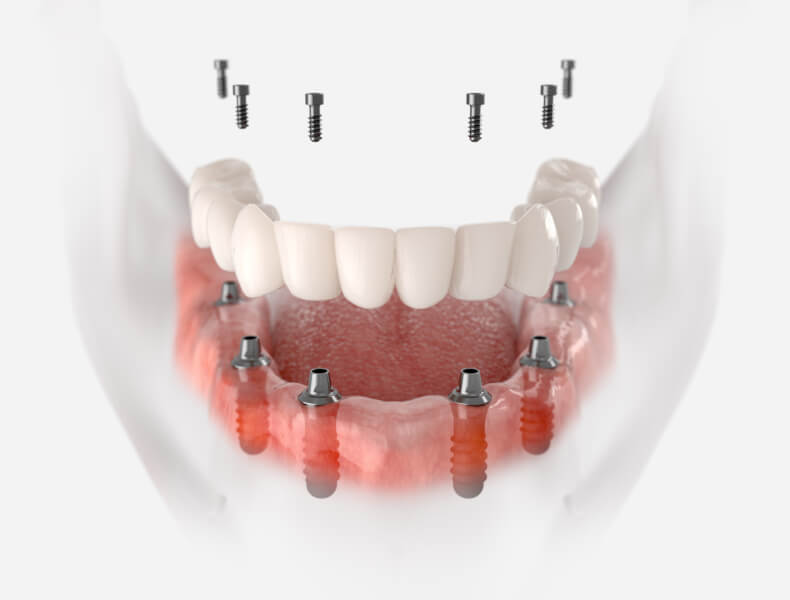Full mouth dental implants replace an entire set of upper or lower teeth for patients suffering from extensive tooth loss. They may be recommended for patients who have lost all or most of their upper or lower teeth or have experienced irreparable damage to all or most teeth. They restore and even enhance full function and aesthetics of healthy, natural teeth so wearers can smile brightly once more and enjoy their favorite foods again.

Many patients opt for full dentures over full dental implants because of the upfront cost involved with implants. However, this is where the benefits of dentures over implants end. Whether looking at long-term value, functionality, aesthetics, convenience, comfort, maintenance, or longevity, full mouth dental implants are far superior.
Dental implants may indeed have a higher upfront cost than dentures, however, when considering the durability of dental implants, which can last a lifetime, as well as the cost of ongoing maintenance for dentures, the long-term value for implants is actually greater.
Dentures are also cumbersome and uncomfortable, require continuous adjustments and even replacement over the years, and only restore partial functionality and visual appearance for the wearer. They require separate care and must be removed each evening, whereas full mouth dental implants are maintained with standard oral hygiene practices such as brushing and flossing.
One of the greatest benefits of dental implants is that they are the only tooth replacement solution that also replaces the roots. The artificial roots of implants fuse to the jawbone to guard against bone loss that naturally occurs with the loss of teeth, which then prevents sagging or deformation of facial features so you can retain your natural beauty for longer!
Full Dental Implants Procedure
Prior to any dental implant procedure, your dental specialist will evaluate the condition of your jawbone to ensure there is sufficient bone structure to support the implant. If not, a bone graft may be required, or in some cases of severe deterioration, dental implant surgery may not be possible. If there are any existing teeth, these will also need to be removed before moving forward with full mouth dental implants. Decisions to extract any healthy natural teeth for the purpose of full dental implants should always be made carefully in consultation with your dental specialist.
Once all preparations have been made and healing from extractions and bone grafts have taken place, the titanium implants can be placed in the jaw. For full mouth dental implants, four implants are typically placed for each of the upper and lower teeth for a total of 8 implants if replacing both top and bottom teeth. These are then allowed to heal and fuse to the bone, a process that may take weeks to months.
Once healed, abutments are placed to connect the implants to your new set of teeth. Your new teeth will be a series of dental crowns and bridges that look, feel, and function just like natural teeth.
FAQs About Full Dental Implants
What is the cost of full mouth dental implants
The cost of full mouth dental implants varies greatly across the country, going from as low as $7,000 all the way up to $90,000. Factors that can determine the cost of full mouth dental implants include location (e.g., prices are higher in cities than in rural communities), the type and quality of materials used, and your oral surgeon or dental specialist’s level of expertise and experience. We highly recommend that you carefully consider the quality of the product and service you are receiving rather than only the cost, as your dental implants are a lifetime investment.
At our dental clinic, we offer top quality full mouth dental implants using the latest technologies and state-of-the-art equipment, performed by our highly skilled and experienced in-house oral surgeon, all while keeping affordability in mind. Our staff are also well-versed in the full range of insurance plans we accept, including MediCal Dental. We can help you determine your coverage for full mouth dental implants and ensure your out-of-pocket costs are kept to a minimum.
Who is a candidate for full dental implants?
If you are missing all or most of your teeth in either or both your upper and/or lower jaw, or if the condition of all or most of your teeth are severely damaged beyond repair, you may be a candidate for full dental implants. Being an oral surgery procedure, patients must be in reasonable general health and should have sufficient jawbone structure to support the implant or be able to receive a bone graft prior to the procedure. Your dental specialist should always conduct a thorough evaluation and consultation to ensure full mouth dental implants are right for you!